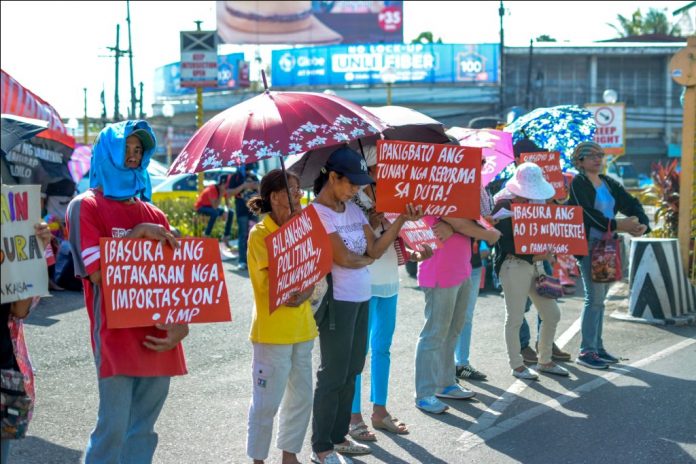
ILOILO City – Farmers from across Panay Island marched in this city to underscore the difficult situation of farmworkers, urban poor and other sectors.
Dubbed as a “march against poverty, hunger and state fascism”, the Oct. 19 mass mobilization was spearheaded by militant farmers’ group Paghugpong sang mga Mangunguma sa Panay kag Guimaras (Pamanggas)
According to the group, amid the rising prices of goods and services, massive landlessness persists.
“Based on the data from the Department of Agrarian Reform (DAR) and Land Bank of the Philippines (LBP), nine out of 10 farmers do not have ownership of the land they till. This is so because DAR has a record of more than 2.7 million hectares awarded from 1972 to end of December 2015, while LBP reported that only 77,000 agrarian reform farmer beneficiaries have fully paid their land amortization, ” said Cris Chavez, secretary-general of Pamanggas.
In addition, the group hit the government’s policies and programs on continued land use conversion and other development projects that further reduces agricultural land devoted for food production.
“In Panay, big real estate developers rush in and make prime agricultural irrigated lands their target for expansive subdivisions,” said Chavez.
In the Aganan River basin alone, Chavez said there were more or less 10,000 hectares identified by the National Irrigation Administration (NIA) as irrigated but people doubted that only about 3,000 hectares were left.
“We advocate for food security but pushed back by these big developers backed up by no other than the government itself. The DAR very well knows there is much illegal land conversions, but it is also the sole government agency who gives conversion orders,” lamented Chavez.
Aside from this, Chavez said the agricultural sector in general finds no defense or support from the government.
“Due to the inherent flaws, loopholes and imperfections of the government’s land reform programs coupled by the neoliberal policies via the World Trade Organization’s Agreement on Agriculture (WTO-AoA), we lost 2.2 million jobs from July 2016 to July 2017. The tax reform law also caused inflation in the price of basic commodities, farm inputs, production and transport cost and other basic services,” said Chavez.
Lucia Capaducio, chairperson on Pamanggas, also hit the government’s “unli-importation” policy as a solution to the country’s rice crisis.
“The Duterte regime solely relies on ‘unli-rice’ importation to arrest the crisis without any semblance of keenness and decisiveness. This is suicidal since world prices are very volatile, usually rising. Also, only five percent of the world’s rice production is available,” said Capaducio.
Worse, she said, the President signed Administrative Order No. 13 (“Removing Non-Tariff Barriers and Streamlining Administrative Procedures on the Importation of Agricultural Products last month” which is in consonance with House Bill 7735 in Congress which would impose tariff instead of quantitative restrictions on rice importation.
“This only hastens the corrupt-ridden bureaucratic procedures regarding rice importation,” said Capaducio.
There were times that these rice-exporting countries held their own production because of calamities, she stressed.
“Duterte can just do at least three great steps which can solve the perennial crisis on food and over which he can have the control, the rules and regulations. One, he must boost agricultural support and services for production. Second, he must regulate the price in the market by imposing orders, seriously dismantle rice cartel and jacking up National Food Authority’s capacity to buy palay at a greater volume and higher price,” Capaducio.
Lastly, he must pull Philippine agriculture and economy out of WTO-AoA, she added./PN




